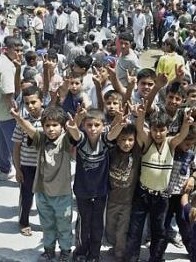
‘I want to go to school. I am bored at home. I want to see my grandparents and cousins. I want to see my friends. I want to be educated. These are my childhood rights.’
This month, Palestinians mark two years of the Israeli military siege on their towns, villages and refugee camps. Laith and his friends, despite the increased restrictions imposed on teachers and students, have been able to managed.
This changed with the April invasions.
During the past academic year, 216 Palestinian students and 17 teachers were killed and 2,514 wounded. During the same period 164 students and 71 teachers were arrested. Because of curfews, 1,289 schools were closed for three weeks.
Laith and his friends could hardly finish their academic year. Many school children had to avoid the presence of Israeli soldiers, occupying their towns. Since June 21, Laith and his friends have been stripped completely of their right to education. During the past three months, the curfew imposed on Nablus was temporarily lifted for 70 hours only.
I know how Laith must have been excited about the start of the new school year. He is brilliant, smart, and loves to play with his friends. Laith could not go to school. He was confined to his home.
Laith: ‘The Israelis have no right to lock me at home. I disobey their orders and take classes in our neighborhood with my friends at their homes. My mother teaches a class and my friends’ mothers teaches too, but this can not replace the schools. This is not justice’.
Recently, the parents of Laith and his friends have started alternative neighborhood education. This involves volunteer teachers. However, this does not replace the quality the schools provide. In their appeal, Laith and his friends said: ‘Despite the curfew and occupation, our defiant challenge to the occupier, involving high risk to the lives of all involved, in particular to us, the children of Nablus, we are determined to claim our right to education’.
The right to education includes that education must be ‘both available in sufficient quantity and physically accessible, within safe physical reach’. Neighborhood education cannot be a replacement of proper teaching at schools.
The children of Nablus learned a tough lesson in human rights. They witnessed the massive destruction inflicted upon their town by the occupier, they witnessed the loss of life, destruction of homes, history, water and other basic infrastructure. They witness hunger, malnutrition, poverty and the deteriorating health conditions.
All they want is to be educated. ‘I am sure that there are people somewhere who could help us get back to school and respond to my call’, writes Laith. With his friends he appealed: ‘We cannot break the curfew alone. We want to open our schools. We want to feel save when we go to school. We want to learn and play with no fear. We, the children of Nablus, appeal to those who are brave enough to safeguard universal human rights to intervene swiftly and decisively’.
Does anyone listen? Is there anyone who cares?





